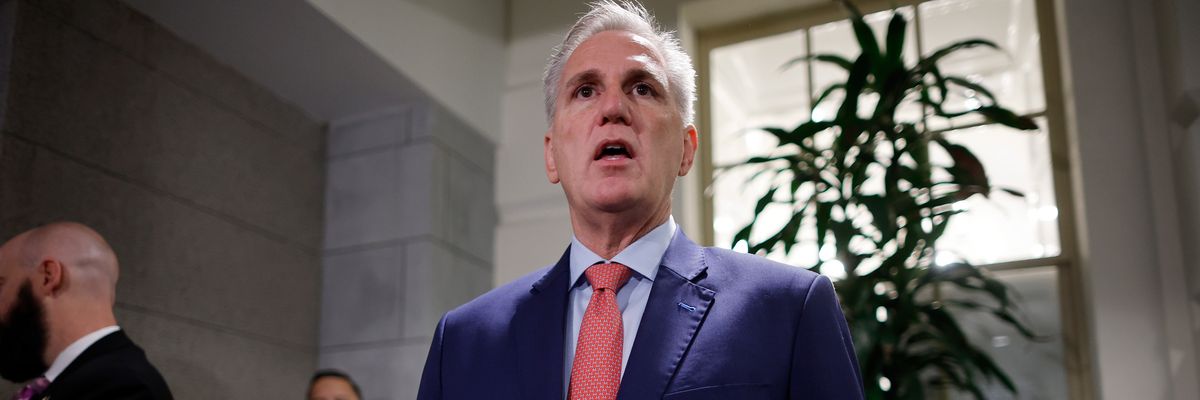Republican U.S. House Speaker Kevin McCarthy on Wednesday said he will not call a vote on the bipartisan stopgap funding bill hashed out in the Senate in a bid to avert a looming government shutdown—a move slammed as "insane" by the Congressional Progressive Caucus chair.
Rep. Bob Good (R-Va.) told reporters at a media briefing that McCarthy (Calif.) informed members of the House GOP conference during a closed-door meeting that he won't allow a vote on the continuing resolution (CR) senators agreed to on Tuesday evening.
Good said the CR would be "dead on arrival" in the lower chamber and that "there's no way the House would pass that bill." Many Republicans—especially the party's hard-right wing—are vehemently opposed to the measure and have threatened to oust McCarthy from the speakership if he works with Democrats on a deal.
Instead, House Republicans on Tuesday voted to open debate on a package of appropriations bills for the departments of Defense, Homeland Security, State, and Agriculture. These are but four of the 12 measures that lawmakers must approve in order to fully fund the federal government. Democratic critics have slammed the GOP for pursuing severe spending cuts that would impact everything from education programs to food and housing aid for low-income families to disaster relief funding.
While President Joe Biden has accused McCarthy of reneging on a deal to raise the debt ceiling in exchange for maintaining current government spending levels, the speaker is pressing for a new meeting with the president to underscore Republican demands to include increased border security in any agreement.
Criticism of McCarthy's refusal to hold a vote on the CR came from both sides of the aisle and both chambers of Congress.
"Senate Democrats and Senate Republicans agreed yesterday to move forward on a bipartisan CR that will keep the government open," Senate Majority Leader Chuck Schumer (D-N.Y.) said in response to McCarthy's decision. "In the House, Republicans have tried everything but bipartisanship, and every path they've pursued to date will inevitably lead to a shutdown."
Congressional Progressive Caucus Chair Pramila Jayapal (D-Wash.) wrote on social media: "This is insane. The Senate passed a funding bill that would avert a government shutdown and give the House more time to pass appropriations bills, but Speaker McCarthy won't even consider it."
"Let us vote, Kevin," she added.
Senate Minority Leader Mitch McConnell (R-Ky.) said on the chamber floor that "a vote against a standard short-term funding measure is a vote against paying over $1 billion in salary for Border Patrol and [Immigration and Customs Enforcement] agents working to track down lethal fentanyl and tame our open borders."
If McCarthy maintains his opposition to the Senate CR, a House majority made up of both Democratic and GOP representatives could come together for a discharge petition to force a vote—though Republicans who did so would likely face accusations of betrayal from their own party.
The U.S. is just four days from its 15th government shutdown since 1980. A shutdown would suspend key federal programs, affecting millions of Americans—especially seniors, children, veterans, and working families. Federal employees would be furloughed or, in the case of workers deemed essential like air traffic controllers, forced to work without pay.
Appearing on MSNBC on Tuesday, Sen. John Fetterman (D-Pa.) told Joy Reid that "there's not one single senator" who wants a shutdown, but "on their side in the House, this is petty chaos by diminished men."
"The last time they did this kind of thing, you know, it resulted in another credit downgrade," Fetterman added. "If they want to be this stupid to do this again, they're going to pay in '24."
